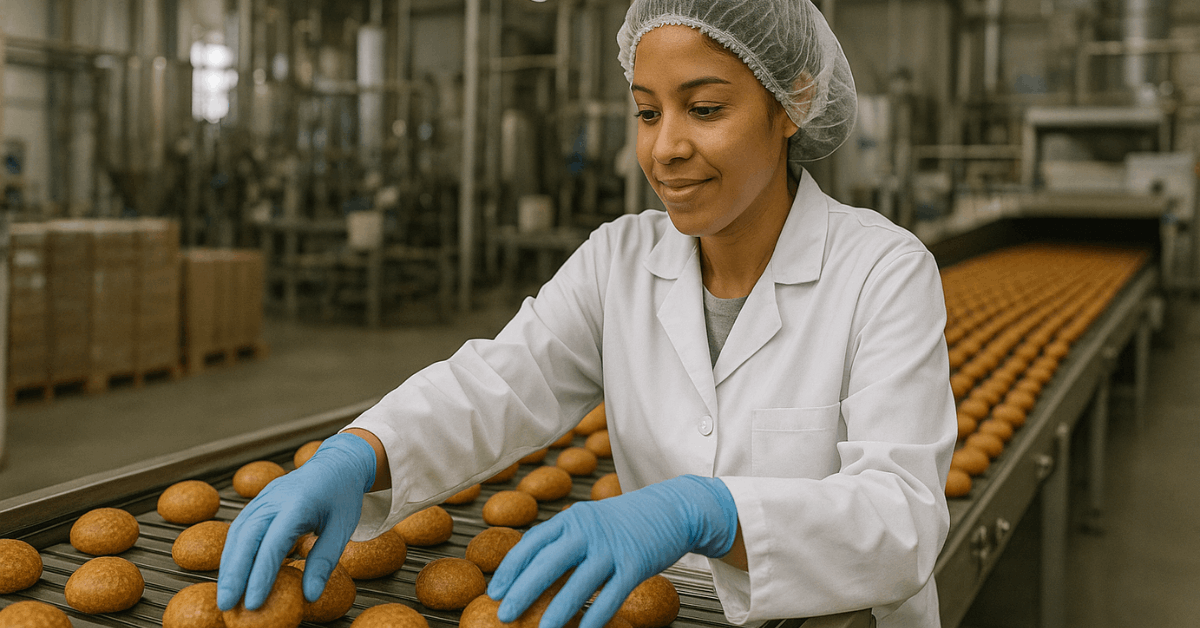Food manufacturing is a massive part of the global economy. It includes everything from food manufacturing jobs, top companies, to packaging and logistics.
If you're looking for job opportunities with stable demand, this sector is worth your attention. This article will guide you through key roles, required skills, and top companies hiring right now.
Understanding the Food Manufacturing Industry
The food manufacturing industry supports both local communities and global markets. It plays a critical role in converting raw materials into packaged products ready for distribution.

What Food Manufacturing Involves?
Food manufacturing covers every stage of production, from ingredient preparation to final packaging. It includes mechanical processing, cooking, quality checks, and cold storage.
This sector operates under strict health and safety regulations. Most facilities follow standardized procedures for hygiene and temperature control.
These steps ensure safe products for consumers and consistent output. Companies rely on specialized teams to monitor and maintain these processes.
Major Product Categories
The industry produces a wide range of food items in large volumes. These include dairy products, canned goods, frozen meals, snacks, and baked items.
Beverages like soft drinks, juices, and energy drinks are also key outputs. Some manufacturers focus on niche markets like organic or allergen-free foods.
The variety of categories allows for a broad range of job opportunities. Demand remains strong due to constant consumer need and export demand.
Role of Technology and Automation
Modern food manufacturing uses automation to improve speed and precision. Machines now handle sorting, mixing, sealing, and labeling.
This reduces human error and increases production efficiency. However, skilled workers are still needed to operate and maintain these systems.
Robotics and data monitoring are common in large factories. These advancements also open new roles in engineering and data analysis.
Key Job Roles in Food Manufacturing
The food manufacturing sector offers a wide range of positions. Each role contributes to product quality, safety, and efficient output.
- Machine Operators: Operate and adjust machines during production. Ensure smooth operation and perform minor maintenance.
- Production Line Workers: Package and label food items efficiently. Maintain cleanliness and follow safety protocols.
- Quality Control Technicians: Inspect products to ensure quality standards. Record data and support safety compliance.
- Maintenance Technicians: Repair and service production equipment. Identify faults and maintain daily functionality.
- Warehouse and Logistics Staff: Manage inventory and prepare shipments. Operate forklifts and track supplies.
- Supervisors and Line Managers: Lead production teams and meet output goals. Oversee schedules and resolve workflow issues.
Required Skills and Qualifications
Job candidates in food manufacturing need physical ability, attention to detail, and basic industry knowledge. These skills support safety, quality, and smooth operations.
- Physical Strength and Endurance: Many roles involve lifting and standing. Workers should be physically fit.
- Attention to Detail: Mistakes can lead to safety risks. Precision is needed for measuring and labeling.
- Knowledge of Safety Standards: Knowing HACCP, GMP, or OSHA guidelines is vital. These protect both workers and consumers.
- Mechanical Aptitude: Running or fixing machines takes basic mechanical skills. This is key for operators and technicians.
- Teamwork and Communication: Clear communication boosts efficiency. Teamwork helps ensure safe production.
- Certifications and Training: Forklift licenses, food handling permits, or technical diplomas help. Many employers also offer on-the-job training.
Top Food Manufacturing Companies Hiring Now
Many global and national brands offer strong employment opportunities in food production. These companies provide structured work environments, benefits, and clear paths for advancement.
Nestlé
Nestlé operates in nearly every food category worldwide. In the U.S., the company runs plants producing frozen meals, baby food, and coffee.
Job seekers can apply for entry-level or specialized technical positions. Facilities prioritize food safety, efficiency, and innovation.
Nestlé offers strong employee benefits, including training and advancement options. You can explore open roles at Nestlé Careers.
Tyson Foods
Tyson Foods is a major employer in meat processing. Facilities are located in Arkansas, Texas, and surrounding regions.
Available positions include maintenance staff, line workers, and packaging assistants. Safety and sanitation are top priorities at all Tyson plants.
The company hires regularly and offers reliable hours. You can apply through Tyson Foods Careers.
PepsiCo
PepsiCo produces popular brands like Lay's, Gatorade, and Pepsi. Manufacturing roles span R&D, logistics, machine operations, and warehousing.
PepsiCo focuses on innovation, sustainability, and team development. Applicants can find positions in large U.S. cities and global hubs.
Most roles include benefits like tuition assistance and performance bonuses. Visit PepsiCo Careers to search for opportunities.
General Mills
General Mills makes cereals, baking mixes, and snack foods. Their plants are located in states like Minnesota and Georgia.
Roles include line operators, forklift drivers, and sanitation staff. The company supports employee well-being and growth.
Diversity, safety, and quality are central values. You can learn more at General Mills Careers.
Cargill
Cargill hires in meat processing, ingredients, and agricultural logistics. Locations include Kansas, Nebraska, and international sites.
Job roles vary from plant technicians to quality inspectors. The company emphasizes training, sustainability, and ethical sourcing.
Safety programs and ongoing learning are part of every job. Search jobs at Cargill Careers.
Application Process and Job Search Tips
Getting started in food manufacturing is straightforward with the right approach. Follow these key steps to effectively find and apply for open roles.
- Use Company Career Pages: Go to official company websites to find and apply for open jobs directly.
- Explore Job Boards: Use sites like Indeed, Glassdoor, and LinkedIn to find roles that match your skills and location.
- Contact Staffing Agencies: These firms help match job seekers with temporary or full-time factory roles.
- Attend Job Fairs: Meet recruiters face-to-face and bring a resume to increase your chances.
- Tailor Your Resume: Adjust your resume for each application and highlight key skills and certifications.
- Follow Up: Send a short message or email after applying to show interest and stay on their radar.
Entry-Level and Skilled Job Opportunities
This industry welcomes both new and experienced workers. Here are common roles and what each entails.

- Cleaning Staff: Maintain cleanliness in production areas. Help ensure hygiene standards are met.
- Packers: Package food items quickly and correctly. Prepare goods for shipping and distribution.
- Material Handlers: Move ingredients and supplies within the facility. Often assist with inventory tasks.
- Machine Operators: Run and monitor equipment during production. Need prior experience or mechanical skills.
- Electricians: Handle electrical systems and repairs in the plant. Must have technical certifications.
- Laboratory Technicians: Test ingredients and finished products for quality. Require science background or lab training.
Benefits and Work Conditions in the Industry
Food manufacturing offers both stability and career growth for job seekers. Here are key advantages and challenges to consider.
- Job Security: Food production is essential, so demand stays steady. Most roles offer long-term employment and dependable schedules.
- Competitive Wages: Many companies offer hourly rates above minimum wage. Pay often increases with skill level or shift differentials.
- Benefits Packages: Workers may receive health insurance, paid time off, and retirement plans. Some companies provide bonuses and wellness support.
- Advancement Opportunities: Entry-level workers can move into supervisory or technical roles. On-the-job training helps employees grow over time.
- Challenging Environments: Tasks can be repetitive or physically demanding. Conditions may include exposure to noise, cold storage, or prolonged standing.
Locations with High Hiring Demand
Some areas have a strong presence in food manufacturing. Urban centers and rural farm regions offer the most job options.
States like Illinois and California lead in hiring demand. Cities such as Chicago and Fresno have frequent openings.
How to Build a Career in Food Manufacturing?
Start with a clear goal and take small steps forward. Use in-house training or short courses to boost your skills.
Focus on areas like safety or machine operations. With steady progress, you can grow into leadership roles.
Final Thoughts: Build Your Future in a Growing Industry
Food manufacturing jobs offer security, skill development, and advancement. Whether you're starting out or bringing technical skills, there's room for you.
Big-name companies are hiring now and seeking workers ready to contribute. Explore your options and apply confidently to begin your next career step.









